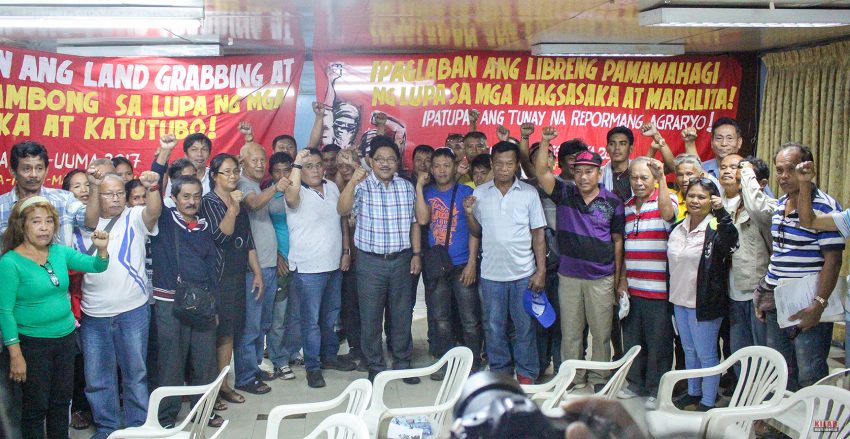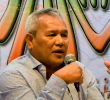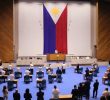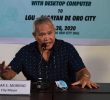
Department of Agrarian Reform Secretary Rafael Mariano, Asst. Sec. Jun Malsi, Undersecretary David Ero and Anakpawis Partylist Rep. Ariel Casilao talk with the farmer-beneficiaries on their clamor for the implementation of installation orders and other land concerns in Mindanao on March 31, 2017. (Photo by Kilab Multimedia)
DAVAO CITY, Philippines— Department of Agrarian Reform Secretary Rafael Mariano ordered the reinstallation of several agrarian reform beneficiaries from Mindanao.
This after leaders of three farmers’ groups in the region trooped to DAR’s national office in Manila and held a picket rally dubbed “Kampuhan sa DAR” to pressure the Secretary to help in the land take-over.
Mariano also ordered the coverage of 3,878 hectares of reservation area inside the University of Southern Mindanao and the Cotabato Foundation College of Science and Technology under the Comprehensive Agrarian Reform Program (CARP) in Arakan, North Cotabato.
The orders came as a result of the March 31 dialogue at DAR Central Office in Quezon City between DAR officials and farmers from USM, Madaum Agrarian Reform Beneficiaries Association, Inc., (MARBAI), Hijo Employees Agrarian Reform Beneficiaries Cooperative 1 (HEARBCO-1) and the Guhusnong Mag-uuma Agrarian Reform Beneficiaries Inc. (GMARBAI).
“ Since we see no legal impediment to prevent the USM or the CFCST from turning over to the DAR portions of its landholdings, I will give the order today to commence with covering those lands under CARP for distribution to potential farmer-beneficiaries,” Mariano said.
He added that the “lands or some of its portions that are reserved by virtue of presidential proclamation for specific public uses shall be segregated from the reservation and transferred to DAR for distribution under CARP to qualified beneficiaries if the two conditions are present,”
These conditions were: “the lands or portions thereof are suitable for agriculture, and if the same is determined by department, in coordination with concerned government agencies or instrumentalities, as no longer actually, directly and exclusively or necessary for the purpose for which they have been reserved.”
Meanwhile, DAR upheld its Cease and Desist Order to protect Marbai farmers in Tagum City, Davao del Norte who have been engaged in a protracted struggle for land ownership covering 145-hectare of banana plantation.
Marbai members occupied the disputed land but were forced to leave the area weeks later after they were subjected to various attacks allegedly perpetrated by the banana plantation guards of Lapanday Foods Corp. (LFC).
Mariano said the agrarian reform beneficiaries will be reinstalled.
The agrarian reform beneficiaries, in a send-off ceremony held at Tagum City on March 27, vowed to fight the “greediness” of LFC until such time that they would secure the Installation Order, according to Jupeth Saroyda, Marbai’s media officer.
Saroyda said they wanted to scrap the Agribusiness Ventures Agreement that LFC invoked as legal basis to forcibly take over 119.25 hectares of lands intended for them. He said that Marbai is not a party to the said AVA, but LFC claims otherwise which has resulted in the dispossession of farmers.
Marbai Spokesperson Antonio Tuyak said the disputed land which was formerly owned by the Hijo plantation was voluntary offered for coverage in the 1990s. The land was awarded to employees and three groups of ARBs were formed. Back in 1999, the HEARBCO1 entered into a 10-year growership contract with LFC and Global Foods Corp.
Salvador Barsibal, one of the Marbai Board members, explained that the purpose of why they brought the issue to DAR in Manila is to show that “the issue of land dispute in Davao region is also happening in other regions or parts of the country.”
Meanwhile, the Kilusang Magbubukid ng Pilipinas expressed hope that the peace talks between the government and the National Democratic Front of the Philippines would pave way for the forging of agreement on the Comprehensive Agreement on Social and Economic Reforms (CASER).
“The next round of talks is crucial and should make positive strides in the discussions on agrarian reform and rural development, national industrialization and protecting the environment,” KMP Spokesperson Joseph Canlas said in a statement on Sunday.
“The panel should discuss thoroughly and if possible, unite on an agreement that contains significant and necessary guidelines for doable reforms to address social and economic issues raised by various sectors including free land distribution, rural development and advance discussions on national industrialization,” he added. (davaotoday.com)










